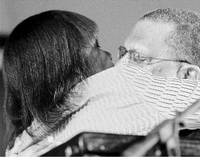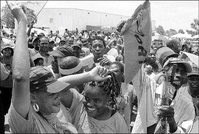The PNP - a step in the right direction
Published: Sunday | October 4, 2009

Franklyn
SEPTEMBER 18, 2009 must be regarded as one of the most important days in the life of the People's National Party (PNP) since it lost the general election on September 3, 2007.
It was the day on which the three most influential Party personalities - Portia Simpson Miller, party president, P.J. Patterson, immediate past president and former prime minister and Peter Phillips, former presidential contender and vice-president of the party - signalled to party members, supporters and the country at large that the party needs to address whatever disunity, real or apparent, which currently exists in the party.
Clearly, they realise that the most immediate task facing the party now is the issue of unity. The second is to present to the people of Jamaica a programme which is a credible alternative to the Jamaica Labour Party's (JLP). Third, to broaden and strengthen itself organisationally. The party needs to do these things not only in the interest of itself, but in the interest of the country, as the JLP has failed in literally every area to live up to expectations and fulfil the promises it made before the 2007 elections.
Failure of the JLP
Under the subhead - A sound macroeconomic policy framework - in its 2007 manifesto, the JLP stated that it will eliminate the fiscal deficit through prudent fiscal management, the elimination of waste and corruption and through revenue-generating economic growth in order to build the surplus to reduce the debt and finance critical expenditures. Contrary to this promise, the fiscal deficit has increased, and waste and corruption have been identified in a number of areas.
The JLP also promised the
provision of jobs, jobs, jobs. One young man observed recently that we were not listening very carefully to Mr Golding, then in Opposition, when he promised what we thought were jobs, jobs, jobs. Instead, explained the young man, Mr Golding was promising jabs, jabs, jabs. The people are now reeling from those jabs. The young man said he got his 'jab' about three months ago when he was told by his employer that he can no longer keep him on the job.
The JLP in its 2007 manifesto also promised that it would seek to create a social partnership programme involving the Government, Opposition, private sector and trade unions to establish the parameters for a new, coordinated thrust towards investment, economic growth and job creation, and the binding commitments on the part of each partner. A social partnership anywhere and everywhere, is built on trust, principally that of the Government.
This trust factor was critical in the evolution and development of the social partnerships in countries such as the Republic of Ireland and Barbados when their economies faced low growth. Yet, in Jamaica, the Government has severely undermined the trust which ought to be reposed in it, when it unilaterally breached a binding contract with public sector workers, particularly teachers, police and nurses.
Portia Simpson Miller's leadership
These blunders by the JLP underline the need for a PNP which is united, credible and organisationally strong.
In addressing these issues let me deal with an issue which underlines all the issues, that is the leadership ability of the president of the party, Portia Simpson Miller. Let no one forget that she was constitutionally elected by the delegates of the party to be the president of the party. Like previous presidents, there are those who will support her and those who will not. Like previous presidents, she has her strengthens and her weaknesses. Like previous presidents her leadership will be under constant scrutiny and observation. However, unlike previous presidents, her support among the delegates at the time of her election was just over 50 per cent. Michael Manley, before her in 1969, had a support of nearly 80 per cent, and P.J. Patterson in 1992 had a support of more than 80 per cent among the delegates.
The challenge facing Portia Simpson Miller, therefore, will be greater than those which faced Michael Manley and P.J. Patterson in uniting the party, and pulling the various personalities and groupings together to work as one united party. It is important for those who did not support her in her presidential bid to let go of their inhibitions and allow the party and the party president the space to grow. Likewise, the party president must realise that she is now being called upon to show the type of leadership required to bring the different personalities and groupings together. She will have to use a lot of her political capital to make this happen, starting with those who believe that the party can do without those who exercised their democratic right to vote as they did during the presidential elections.
Her recent appeal for all hands on deck, the response by former president P.J. Patterson to her call, and the indication by Peter Phillips in his introduction of her on September 18 as the person who has been called upon to lead the party at this time sends the right signal to party members, supporters and the country. The overwhelming positive response of the supporters in the national arena to this show of unity is testimony to the fact that the country wants a united PNP. This show of unity, however, is part of a process. Unity does not come by the snap of a finger or by a wish, it comes by hard work and a desire and a will to have real unity. This unity must now manifest itself in and through every member and at every level of the party. If the party is to remain viable it must continue to address the issue of unity in a real way.
Issues to be addressed
The PNP also has to show that it is a credible alternative to the JLP. What is needed is an Opposition which is not only on top of the issues but can, in a clear and studied manner, bring hope to the people by offering workable alternatives. The continuation of the series of discussions under the banner of the progressive agenda must continue, but it must now begin to broaden its base by involving more and more members of the public.
In developing its programmatic alternative the PNP has to address four issues which, unfortunately, it has allowed to fester over time.
The first is that of the perception that the party is corrupt. This has become a handicap of the party in recent years. The leadership of the party must do everything to rid the party of those who are either unfamiliar, or ignorant, or choose to deliberately ignore the tried and tested principle of the party, which is that of giving of oneself and not be perceived as taking what belongs to the state.
The second issue is the view posited by a number of persons, especially middle-class professionals, that the PNP is no longer interested in what they have to offer. This is a harmful development and must be corrected at all cost. The PNP has traditionally been a multi-class party with a strong emphasis on those who are drawn from among the working and the middle classes. It has always been able to attract the best and the brightest from among our teachers, farmers, artisans, clergy, musicians, academic, nurses, journalists, businessmen, lawyers, community leaders, students, trade unionists and the different social groups in the society.
Our middle-class professionals are critical to the development and growth of the PNP. They are the ones who have, over the years, been called upon to give leadership to the party inside and outside of government. A conscious effort must be made by the PNP to reach out to these persons, not at the exclusion of others, but in order to ensure that the party is on the cutting edge of the most modern of ideas. It is equally true to argue that many middle-class professionals, some of whom have personally benefited from state policies, have abandoned the party political process to pursue their own personal agenda, without showing any concern for the development of the country.
PNP ambivalent
The third issue is the notion by many owners of medium and large businesses is that the PNP is at best ambivalent, and at worst hostile to capital, and hence, antithetical to their interest. If that were so at any time it is not so now. Two of the lessons to be learnt from the period of the 1970s are that no one social class can develop the country, and second, deep divisions among the different social classes will not facilitate any type of meaningful and sustainable growth in Jamaica. During the PNP's tenure in government from 1989 to 2007 the policy was one of economic growth with social equity, including broadening the base of ownership in the country. The existing private sector is what obtains and it is neither in the interest of the PNP nor the country for the PNP to be antagonistic towards the holders and owners of capital.
The forth issue is that the party, has unwittingly, allowed the perpetuation of the view in some quarters that the PNP achieved nothing positive during its 18 years in office. In fact, the JLP was able to outmanoeuvre the PNP on this issue during the 2007 election campaign, especially among the young people. Yet, the JLP, since its ascension to power in 2007, except for the abolition of user fees in hospitals, has not implemented one significant initiative since being returned to office. They have built on programmes which were already started. If these projects were not of worth to the country's development the JLP would have abandoned them a long time ago. I speak of projects such as the National Health Fund, the bridge and road building programme, the education reform programme, the Tourism Enhancement Fund and a host of others.
The country requires, in fact, demands a vibrant, well-organised, united and visionary Opposition. The PNP has the capacity and capability to be that Opposition. It has done so in the past and it can do so again. The public display of unity at the conference on September 18, 2009, by its principal personalities, is a start. It needs to build on that in order to respond to the call of the people when the time comes.
Delano Franklyn is a former junior minister in the Ministry of Foreign Affairs.

Portia Simpson Miller

PNP President Portia Simpson Miller hugs Dr Peter Phillips.

Jubilant PNP supporters outside the National Arena.







